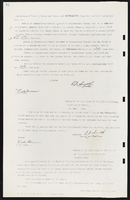Search the Special Collections and Archives Portal
Search Results
Mamie Buettner oral history interview
Identifier
Abstract
Oral history interview with Mamie Buettner conducted by Gertrude Anne Moore on February 21, 1975 for the Ralph Roske Oral History Project on Early Las Vegas. During the interview Buettner discusses the history of Las Vegas, Nevada and offers insight into the day-to-day life of a Las Vegas old timer.
Archival Collection
Lloyd Bell oral history interview
Identifier
Abstract
Oral history interview with Lloyd Bell conducted by Perry Kaufman on April 12-13, 1972 for the Ralph Roske Oral History Project on Early Las Vegas. This interview begins with Bell discussing advancements in technology have affected police relations with the community, particularly in the context of the transition from “beat” policing to vehicle patrol. Bell also discusses the advantages and disadvantages between having an elected sheriff versus an appointed police chief. The interview continues into a discussion of county licensing requirements as they relate to businesses and the influence of organized crime. Bell additionally discusses specific organized crime figures and prostitution.
Archival Collection
Jackie Brantley oral history interview
Identifier
Abstract
Oral history interview with Jackie Brantley conducted by Claytee White on October 27, 1996 for the Women's Research Institute of Nevada (WRIN) Las Vegas Women Oral History Project. Brantley begins her interview by briefly discussing her family history and parents' jobs in Las Vegas, Nevada in the late 1940s. Brantley then goes on to discuss segregation in Las Vegas. She discusses segregation on the Strip, and in pools, schools, and nightclubs. Afterwards, Brantley discusses her career experiences working for the Clark County School District and her management position at the Desert Inn Hotel and Casino in the early 1970s.
Archival Collection
William Wright oral history interview
Identifier
Abstract
Oral history interview with William Wright conducted by Andrew Weiss on February 26, 1979 for the Ralph Roske Oral History Project on Early Las Vegas. In this interview, Wright discusses his career working for the
Archival Collection
Lucile Bunker oral history interview
Identifier
Abstract
Oral history interview with Lucile Bunker conducted by herself on March 10, 1977 for the Ralph Roske Oral History Project on Early Las Vegas. Bunker recalls her early experiences and various jobs in Las Vegas, Nevada. She also describes her experiences as the wife of former Senator Berkeley Bunker and living in Washington, D.C.. Bunker then discusses her missionary work, the early above-ground atomic testing, and the building of Hoover Dam.
Archival Collection
Nadine Tobin oral history interview
Identifier
Abstract
Oral history interview with Nadine Tobin conducted by Pamella Perry on February 10, 1979 for the Ralph Roske Oral History Project on Early Las Vegas. In this interview, Tobin discusses her personal history and the history of Las Vegas, Nevada. Tobin describes moving to Las Vegas as a child in 1941, life in the city, and how the city has changed and grown. Tobin then talks about the arrival of Bugsy Siegel; new casinos in Las Vegas; and the El Dorado Ranch, a divorce ranch. She goes on to discuss her career as a photograph lab technician, how photographs were developed, new printing technology, and printing photographs for the Atomic Energy Commission and Nevada Highway Patrol. Lastly, she discusses her recreation activities and the Helldorado Parade.
Archival Collection
Lawrence Weekly oral history interview
Identifier
Abstract
Oral history interview with Lawrence Weekly conducted by Elsha Harris Yolanda on November 19, 2014 for the African Americans in Las Vegas: a Collaborative Oral History Project. In this interview, Weekly discusses his personal history and growing up in Las Vegas, Nevada. He talks about the importance of religion in his upbringing and his parent’s employment in the hospitality industry in Las Vegas. Weekly describes the racial discrimination he experienced in education, attending the College of Southern Nevada and later transferring to Grambling State University in Louisiana. Later, Weekly discusses his rationale for attending a historically Black college, his career as a Clark County Commissioner, and the reopening of F Street. Lastly, Weekly talks about the lack of progress in race relations across the United States.
Archival Collection
Michael Ciccolo oral history interview
Identifier
Abstract
Oral history with Michael Ciccolo conducted by Claytee D. White on September 18, 2018 for the Remembering 1 October Oral History Project. In this interview, Ciccolo, a doctor at Sunrise Hospital in Las Vegas, Nevada, discusses the early morning after the mass shooting on October 1, 2017. He participated in surgery for two victims in the early morning after the shooting. As a doctor trained in Iowa, Arizona, and California, Ciccolo and his family love the city of Las Vegas. He trained at the University of Iowa, University of Arizona, and University of Southern California. His thoughts after the October 1 tragedy include the belief that as a society, we are not grateful enough for everyday things. He also discusses anger, and his conflicting thoughts on gun ownership.
Archival Collection
Christine Szukala oral history interview
Identifier
Abstract
Oral history interview with Christine Szukala conducted by Bridgette Foote on November 12, 2021 for Reflections: The Las Vegas Asian American and Pacific Islander Oral History Project.
Christine shares her family history and the story of her Thai mother and American Air Force father who met in Thailand and married before moving to the United States in 1970. She talks about her upbringing in Las Vegas, Nevada near Nellis Air Force base with her six siblings. Christine discusses her beliefs of how her newly immigrated mother adapted to American life, including altering her recipes to fit her husband's taste and reducing her visits to nearby Buddhist temples.
Archival Collection

